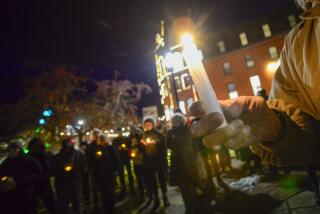Vermont Senate Nears OK on Civil Unions for Gays
- Share via
MONTPELIER, Vt. — A bill that would create the closest thing in America to gay marriage won preliminary approval in the state Senate on Tuesday after a debate watched by people wearing either white ribbons or pink stickers to show where they stood.
The 19-11 vote came after the Senate defeated two proposed constitutional amendments designed to outlaw same-sex marriage.
The bill will be up for final approval in the Senate today. A similar measure has already passed the House, but that chamber will have to consider changes made by the Senate. Democratic Gov. Howard Dean has said he will sign the bill.
The measure would enable gay couples to form civil unions that would entitle them to all 300 or so rights and benefits available under state law to married couples. No other state has gone as far as Vermont to give gay couples something approximating marriage.
But Vermont’s gay couples would not be entitled to the federal benefits available to married couples in such areas as taxes and Social Security. Other states also would probably not recognize such unions.
The reaction of the dozens of people sitting in the Senate galleries, standing along the chamber’s walls and milling about the hallways was subdued.
The Senate debate lacked much of the passion displayed during 17 hours of debate last month in the House, where the Legislature’s only openly gay member spoke several times, drawing tears to the eyes of many observers.
Opponents, wearing white ribbons to signify their backing for traditional marriage, stood next to supporters wearing pink stickers favoring civil unions.
Senators who voted against the bill said they were doing so because their constituents opposed it. Others said they feared the national and international reaction.
The state Supreme Court set the stage for the legislation with its unanimous December ruling that same-sex couples were being unconstitutionally denied the benefits of marriage.
The legislation would create a status parallel to marriage by allowing gay and lesbian couples to obtain a license from their town clerks and have their unions certified by a judge or member of the clergy.
Opponents of the measure attempted to derail it with the two constitutional amendments. One would have added to the state Constitution the definition of marriage as a union between a man and a woman. The second would have overturned the Supreme Court ruling.
Neither amendment won a simple majority, let alone the two-thirds required for constitutional amendments.
More to Read
Sign up for Essential California
The most important California stories and recommendations in your inbox every morning.
You may occasionally receive promotional content from the Los Angeles Times.













